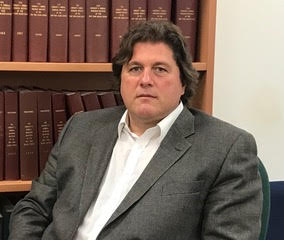 Leif Oxburgh, DVM, PhD, Director
Leif Oxburgh, DVM, PhD, Director
The Rogosin Institute is pleased to announce that Dr. Oxburgh brought his kidney regenerative medicine laboratory to The Rogosin Institute beginning July 2019.
Research Synopsis
The goal of Dr. Oxburgh’s research is to understand how kidney tissue can be grown from stem cells. Currently, access to transplant organs is very limited, and the long-term objective of the research is to provide an abundant and reliable source of kidney tissue for patients with kidney failure. In the nearer term, the research will provide insights into the mechanisms that control formation of kidney tissue. This will be applied to the development of methods to replicate kidney tissue from patients in the laboratory, which can be used to test treatment strategies for the individual patient.
Job Opportunities
Regenerative Medicine for kidney failure
For some people loss of kidney function reaches a point where replacement of kidney function is necessary. This is generally provided in the form of dialysis or kidney transplantation. There are limitations with both of these approaches. Dialysis provides blood filtration to prevent build-up of waste products, but is highly invasive in patients’ lives and only provides one essential function of this multi-functional organ leading to relatively poor quality of life. Transplantation is generally a far better solution as it provides all of the complex functions of the kidney, ensuring an immense improvement in life quality for most patients. However, the availability of transplant organs is very limited, and patients must be able to endure the lifelong suppression of their immune system required to avoid rejection of the foreign kidney.
What if we could make new kidney tissue from stem cells to increase access to transplantation?
And what if we could make new kidney tissue from a patient’s own stem cells so that we could reduce the need for immunosuppression?
These are fundamental questions that scientists interested in cures for kidney disease have asked for 20 years, but the technology to start answering them has only just become available. The past 5 years have seen extremely rapid advances in efforts to generate patient-specific kidney tissue from stem cells. One important contributing factor was the discovery of stem cell reprogramming from adults, providing a route to generating stem cells from any individual. Another essential factor was the deep level of understanding that we had attained through basic research of the essential mechanisms governing the formation of the kidney during the fetal period. This has enabled the development of procedures to differentiate stem cells to the building blocks for kidney tissue through a process known as directed differentiation. These building blocks can be assembled into small fragments of kidney tissue in the laboratory – organoids. This remarkably rapid progress has led us to the point where we understand that making kidney tissue is feasible, but we need to develop tools to ensure it is properly functional and we also need to scale it up to a format that can be helpful to a patient.
Progress: Dr. Leif Oxburgh now routinely generates human kidney tissue fragments in the laboratory that display hallmark structures of the human kidney. He has implanted these into rodents to ascertain whether they can attract blood vessels, become part of the host circulatory system, and filter blood. The kidney organoids integrate efficiently with the host and commence filtration, which provides another encouraging proof of feasibility that this technology has the potential to help patients. Current work is exploring how to achieve urine collection from implanted kidney tissue, and how to stimulate its growth in the host to maximize its functional capacity.
Why was this laboratory brought to The Rogosin Institute?
The perfect intersection of clinical and research objectives makes the placement of the Kidney Regenerative Medicine Laboratory within The Rogosin Institute an obvious strategic development. With its singular focus on care for the kidney disease patient and its concentration of outstanding nephrologists and care providers, the Institute provides a fertile environment for development of the project. Proximity of academic and physical resources at Weill Cornell Medical College, Columbia University, and The Rockefeller University offer unparalleled scope for collaboration to advance the project using cutting edge research tools and new concepts.
For additional information:
Leif Oxburgh, DVM, PhD
646-317-0825
Publications:
Gupta AK, Coburn JM, Davis-Knowlton J, Kimmerling E, Kaplan DL, Oxburgh L. Scaffolding kidney organoids on silk. J Tissue Eng Regen Med. 2019 May;13(5):812-822.
Brown AC, Gupta AK, Oxburgh L. Long-Term Culture of Nephron Progenitor Cells Ex Vivo. Methods Mol Biol. 2019;1926:63-75.
Oxburgh L. Kidney Nephron Determination. Annu Rev Cell Dev Biol. 2018 Oct 6;34:427-450.
Muthukrishnan SD, Ryzhov S, Karolak M, Oxburgh L. Nephron progenitor cell death elicits a limited compensatory response associated with interstitial expansion in the neonatal kidney. Dis Model Mech. 2018 Jan 29;11(1).
Oxburgh L, Carroll TJ, Cleaver O, Gossett DR, Hoshizaki DK, Hubbell JA, Humphreys BD, Jain S, Jensen J, Kaplan DL, Kesselman C, Ketchum CJ, Little MH, McMahon AP, Shankland SJ, Spence JR, Valerius MT, Wertheim JA, Wessely O, Zheng Y, Drummond IA. (Re)Building a Kidney. J Am Soc Nephrol. 2017 May;28(5):1370-1378.
Oxburgh L, Carroll TJ. The bioengineered kidney: science or science fiction? Curr Opin Nephrol Hypertens. 2016 Jul;25(4):343-7.
Muthukrishnan SD, Yang X, Friesel R, Oxburgh L. Concurrent BMP7 and FGF9 signalling governs AP-1 function to promote self-renewal of nephron progenitor cells. Nat Commun. 2015 Dec 4;6:10027.
Brown AC, Muthukrishnan SD, Oxburgh L. A synthetic niche for nephron progenitor cells. Dev Cell. 2015 Jul 27;34(2):229-41.
 Leif Oxburgh, DVM, PhD, Director
Leif Oxburgh, DVM, PhD, Director